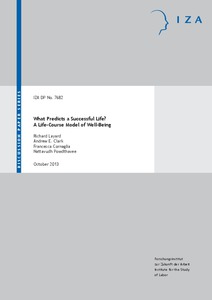What predicts a successful life? A life-course model of well-being

Layard, Richard ; Clark, Andrew E. ; Cornaglia, Francesca ; Powdthavee, Nattavudh
Institute of Labor Economics, Bonn
IZA - Bonn
2013
61 p.
educational policy ; health ; quality of life ; well being
Discussion Paper
7682
Social protection
English
Bibliogr.
"If policy-makers care about well-being, they need a recursive model of how adult life-satisfaction is predicted by childhood influences, acting both directly and (indirectly) through adult circumstances. We estimate such a model using the British Cohort Study (1970). The most powerful childhood predictor of adult life-satisfaction is the child's emotional health. Next comes the child's conduct. The least powerful predictor is the child's intellectual development. This has obvious implications for educational policy. Among adult circumstances, family income accounts for only 0.5% of the variance of life-satisfaction. Mental and physical health are much more important."
Digital
The ETUI is co-funded by the European Union. Views and opinions expressed are however those of the author(s) only and do not necessarily reflect those of the European Union or the ETUI.